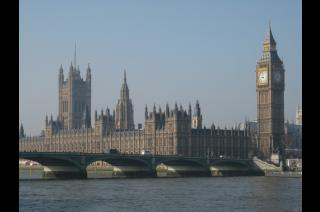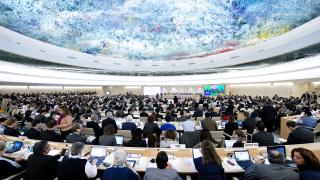UNA-UK's report, "Keeping Britain Global" makes the case that Britain needs to champion global values, and invest in the health of our international system andmakes reccomendations across five key areas where we believe the UK can make a useful contribution at a global level, and where we feel Britain’s willingness to take action will provide a fair and appropriate test of Britain’s support for the rules-based international order. This is what we have to say about:
Nuclear Disarmament
Our international system of treaties, rules and norms has helped to create more predictable and stable international relations and has controlled the proliferation of nuclear technology, reducing the likelihood of nuclear weapons falling into the wrong hands.
At the heart of this system is a bargain written into the 1968 Treaty on the NonProliferation of Nuclear Weapons (NPT). The 186 non-nuclear States Parties to the Treaty are prohibited from developing nuclear weapons; in exchange, the five nuclear-armed States Parties, including the UK, have committed to a process of multilateral nuclear disarmament.
With little appetite for disarmament apparent from nuclear-weapon states, this bargain is increasingly called into question. Deteriorating international relations, in part due to dissatisfaction with the slow pace of disarmament, caused a failure of the 2015 NPT Review Conference to agree an outcome.
Domestically, the debate has been highly politicised, with the decision taken to renew the UK’s nuclear weapon system with little public consultation or informed discussion on the international context. The UK’s 2015 National Security Strategy and Strategic Defence and Security Review failed to build on modest progress made in 2010 with regards to disarmament and missed the opportunity to follow the French lead in being explicit about disarmament obligations.
In recent years, a new movement to eliminate nuclear weapons based on humanitarian imperatives has gained traction, with non-nuclear weapon states and civil society working together to put the catastrophic environmental, health and societal impacts of any use of nuclear weapons at the forefront of discussions.
The humanitarian movement has now culminated in UN negotiations to create a legally binding treaty to prohibit nuclear weapons, mandated by a General Assembly resolution passed with 113 states voting in favour, 35 against, and 13 abstentions. The UK voted against the resolution, opposing the 2017 negotiations.
Given the dangers arising from deteriorating international relations and the potential emergence of a new arms race between the nuclear powers, principled and engaged leadership from nuclear weapon states is sorely needed. This means Britain taking unmistakable steps to demonstrate its commitment to multilateral disarmament while working energetically to engage with the legitimate concerns of non-nuclear-weapon states.
Recommendations
The UK should:
- Take unmistakable actions to improve diplomatic relations between nuclear-weapon and non-nuclear-weapon states by participating in negotiations and stimulating dialogue
- Work energetically to restore the health of the NPT regime, including by initiating an inclusive process to work on the 2010 64-point Action Plan and by publish an annual report on the UK’s contribution to its implementation
- Breathe life into the ‘P5 Process’ talks between the nuclear weapon states including by strengthening their agenda and increasing their transparency
- Review the prominence given to nuclear weapons in the UK’s security doctrines in close consultation with parliament and civil society
- Use the opportunity of the 2018 UN High Level Conference on Nuclear Disarmament to highlight UK leadership and progress on this issue





